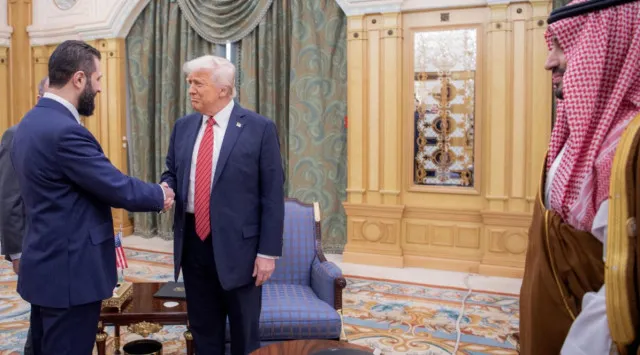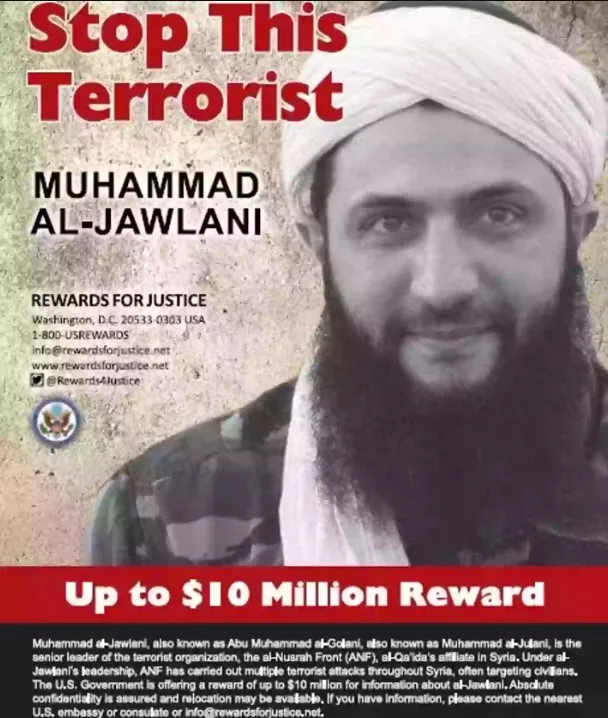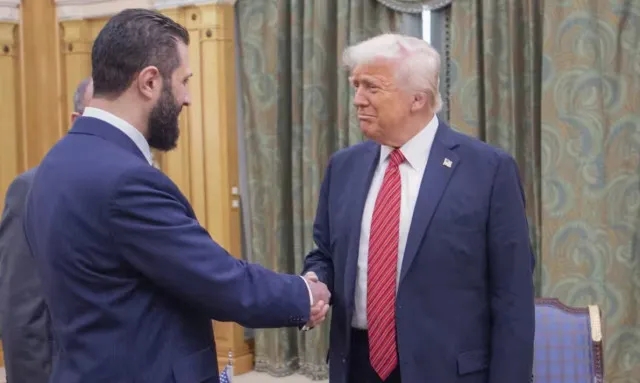Donald Trump’s handshake with Syria’s president during his Middle East visit sparked global controversy due to the leader’s militant past.
During his recent trip to the Middle East, U.S. President Donald Trump shocked many when he shook hands with Syrian President Ahmed al-Sharaa.
Handshakes between world leaders are typically seen as standard diplomatic gestures.
However, this one drew controversy because Sharaa was once on America’s most-wanted list with a $10 million bounty on his head.

From insurgent to President of Syria
Before rising to power, Ahmed al-Sharaa was known by another name: Abu Muhammad al-Jawlani.
He played a central role in Syria’s insurgency and was a key figure in the al-Nusra Front, an organization affiliated with al-Qaeda.
The U.S. designated the group a terrorist organization in 2012. His involvement in violent operations during the Iraq War and in Syria led to his arrest and five-year detention by U.S. forces.
Despite a later public break with al-Qaeda in 2016, his reputation remained tied to numerous reported war crimes.

This marked a dramatic shift in U.S. policy.
Trump’s praise of Sharaa as a “fighter” and “leader” signaled a sharp shift from previous U.S. administrations’ stance
Even more surprising was Trump’s decision to lift all sanctions against Syria shortly after the handshake.
This policy shift followed the collapse of Bashar al-Assad’s regime, after which Sharaa assumed leadership.
Soon after his rise to power, the U.S. quietly removed the bounty on his head
The image of Trump shaking hands with a man previously associated with extremist violence was seen by critics as a betrayal of U.S. values and victims of terrorism.
Many questioned the message this sent to both allies and adversaries, fearing it could undermine America’s stance against global terrorism

Social media reactions
One user said: A leader that will talk with his adversaries, what novel idea! This is leadership 101.
Negotiating in good faith and trying to build bridges instead of blowing them up
The second user wrote: What makes these foreigners believe or trust him? What kind of a game they are playing now?
The third user said: Much like Kissinger. I hope that the US extracts a promise (and enforces that promise) that Syrian leadership will stop the killing and oppression of Christians, Kurds, Druids, and others.
If not, this is more than disappointing. We’ll see.
The fourth user said: Israel is increasingly isolated, because Israel prefers to fight only to seize and steal Syrian and Palestinian land!
Donald Trump is starting to know the real purpose of Netanyahu’s ambition to continue fighting!
Another user said: İ don’t care anymore if these arab guys are reliable or not.
Sharaa means that millions of Syrian refugees can go back . That’s the only important issue. Otherwise other countries will become syria.
Someone added: An ISIS terrorist (Al sharaa) who $10m bounty is on his head, met and shook hands with Donald trump in Riyadh.
Al_sharaa said trump tower will be built in syria. Does this mean, no one is a terrorist when top dollar speak?

Other controversies on the trip
Trump’s Middle East visit packed with additional headlines
In Saudi Arabia, he appeared to fall asleep during a security briefing – a moment critics quickly compared to his past jabs at Joe Biden.
Ironically, Trump once nicknamed his predecessor “Sleepy Joe,” but his own behavior has now drawn similar ridicule.
Despite the controversies, Trump secured a significant economic agreement with Saudi Arabia.
The deal includes $600 billion in future investment from the Gulf kingdom into the U.S. economy. His arrival was met with a fighter jet escort, adding a dramatic touch to the visit.
Meanwhile, in a surprising development, Trump suggested he might accept a $400 million aircraft from Qatar as a replacement for Air Force One